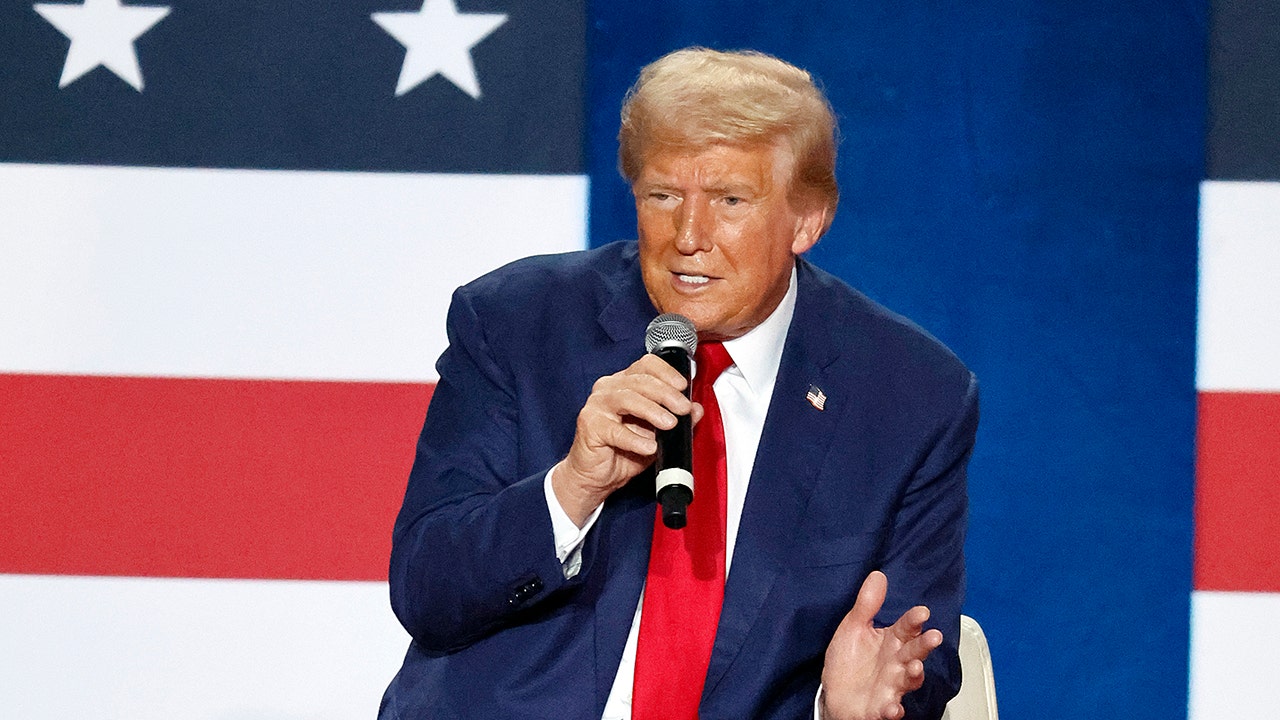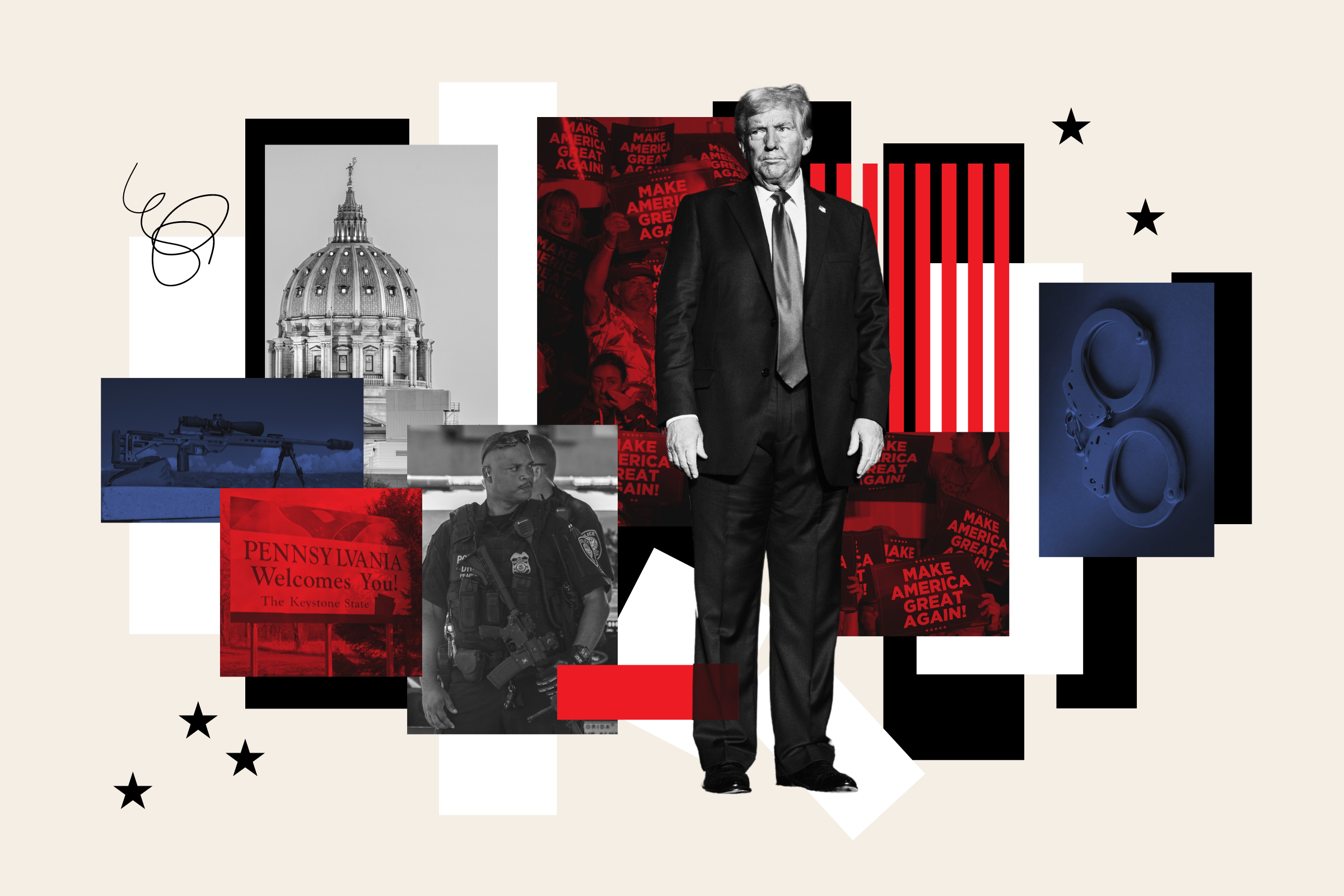World
Expert warns UN's role in AI regulation could lead to safety overreach
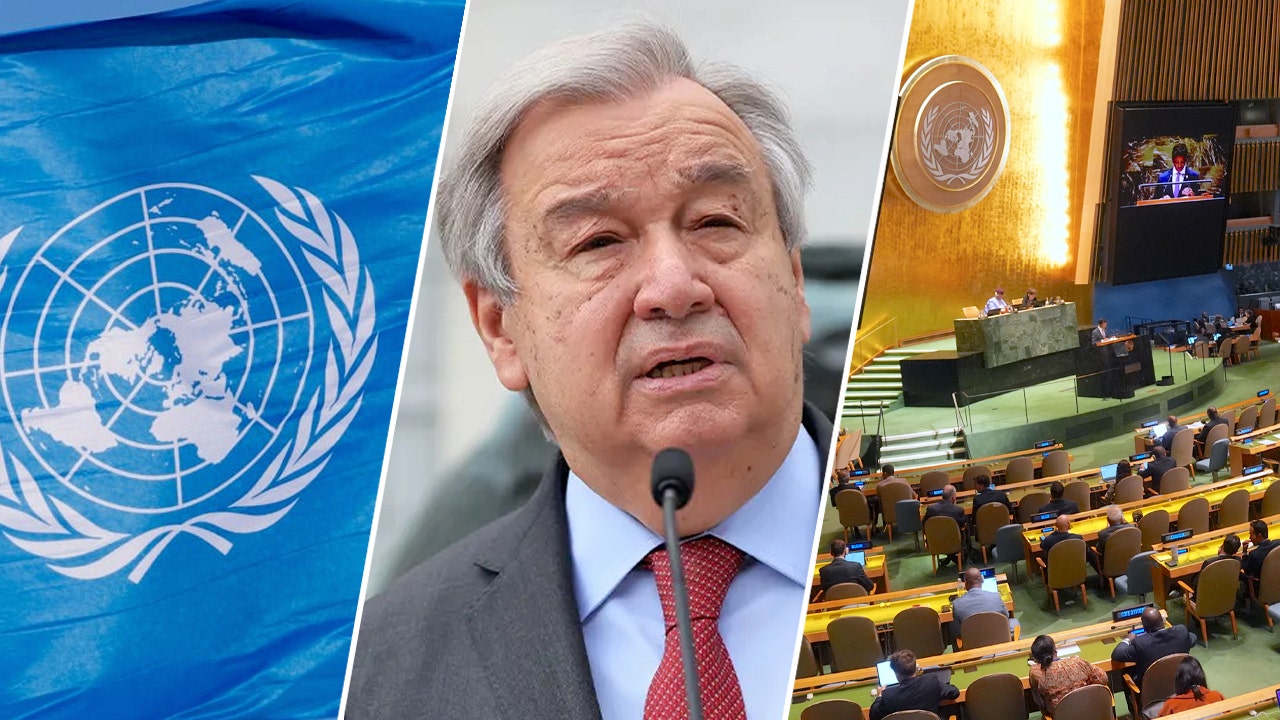
The United Nations (U.N.) advisory body on artificial intelligence (AI) last week issued seven recommendations to address AI-related risks, but an expert told Fox News Digital the points do not cover critical areas of concern.
“They didn’t really say much about the unique role of AI in different parts of the world, and I think they needed to be a little more aware that different economic structures and different regulatory structures that already exist are going to cause different outcomes,” Phil Siegel, co-founder of the Center for Advanced Preparedness and Threat Response Simulation (CAPTRS), said.
“I think that they could have done a better job of — instead of just trying to go to the lowest common denominator — being a little more specific around what does a state like the United States, what is unique there?” Siegel said. “How does what we do in the United States impact others, and what should we be looking at specifically for us?
“Same thing with Europe. They have much more strict privacy needs or rules in Europe,” he noted. “What does that mean? I think it would have gained them a little bit of credibility to be a little more specific around the differences that our environments around the world cause for AI.”
GOV NEWSOM VETOES BILL TO ESTABLISH FIRST-IN-NATION AI SAFETY REGULATIONS IN CALIFORNIA
United Nations Secretary-General António Guterres addresses the 79th United Nations General Assembly at U.N. headquarters in New York Sept. 24, 2024. (Reuters/Mike Segar)
The U.N. Secretary-General’s High-level Advisory Body on AI published its suggested guidelines Sept. 19, which aimed to cover “global AI governance gaps” among its 193 member states.
The body suggested establishing an International Scientific Panel on AI, creating a policy dialogue on AI governance, creating a global AI capacity development network, establishing a global AI fund, fostering of an AI data framework and forming an AI office in the U.N. Secretariat.
These measures, Siegel said, seem to be an effort by the U.N. to establish “a little bit more than a seat at the table, maybe a better seat at the table in some other areas.”
LIONSGATE’S BOLD MOVE INTO AI IS ABOUT TO CHANGE FILMMAKING FOREVER
“If you want to take it at face value, I think what they’re doing is saying some of these recommendations that different member states have come up with have been good, especially in the European Union, since they match a lot of those,” Siegel noted.
“I think … it sets the bar in the right direction or the pointer in the right direction that people need to start paying attention to these things and letting it get off the rails, but I think some of it is just it’s not really doable.”
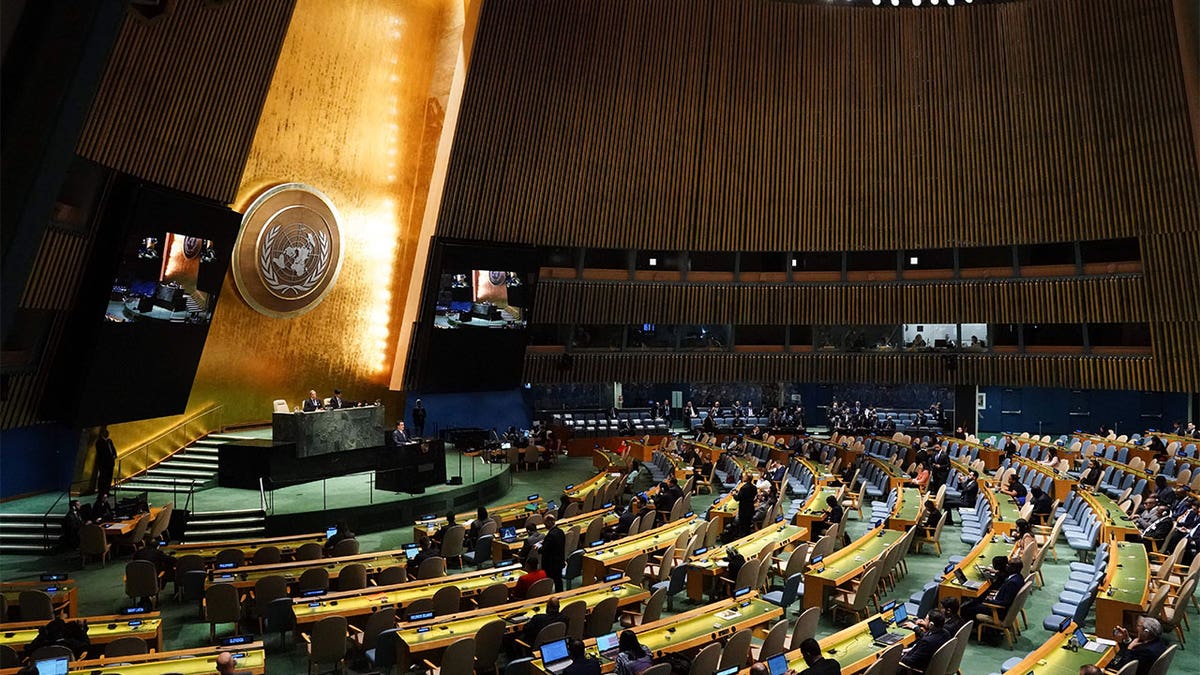
Iraqi Prime Minister Mohammed Shia al-Sudani addresses the 78th United Nations General Assembly at U.N. headquarters in New York City Sept. 22, 2023. (Bryan R. Smith/AFP via Getty Images)
Multiple entities have pursued global-level coordination on AI policy as nations seek to maintain an advantage while preventing rivals from developing into pacing challenges. While trying to develop AI for every possible use, they also hold safety summits to try and “align” policy, such as the upcoming U.S.-led summit in California in November.
Siegel acknowledged the U.N. is likely to be one of the better options to help coordinate such efforts as an already-existing global forum — even as countries try to set up their own safety institutes to coordinate safety guidelines between nations. But he remained concerned about U.N. overreach.
DEMOCRAT SENATOR TARGETED BY DEEPFAKE IMPERSONATOR OF UKRAINIAN OFFICIAL ON ZOOM CALL: REPORTS
“They probably should be coordinated through the U.N., but not with rules and kind of hard and fast things that the member states have to do, but a way of implementing best practices,” Siegel suggested.
“I think there’s a little bit of a trust issue with the United Nations given they have tried to, as I said, gain a little bit more than a seat at the table in some other areas and gotten slapped back. On the other hand, you know, it already exists.
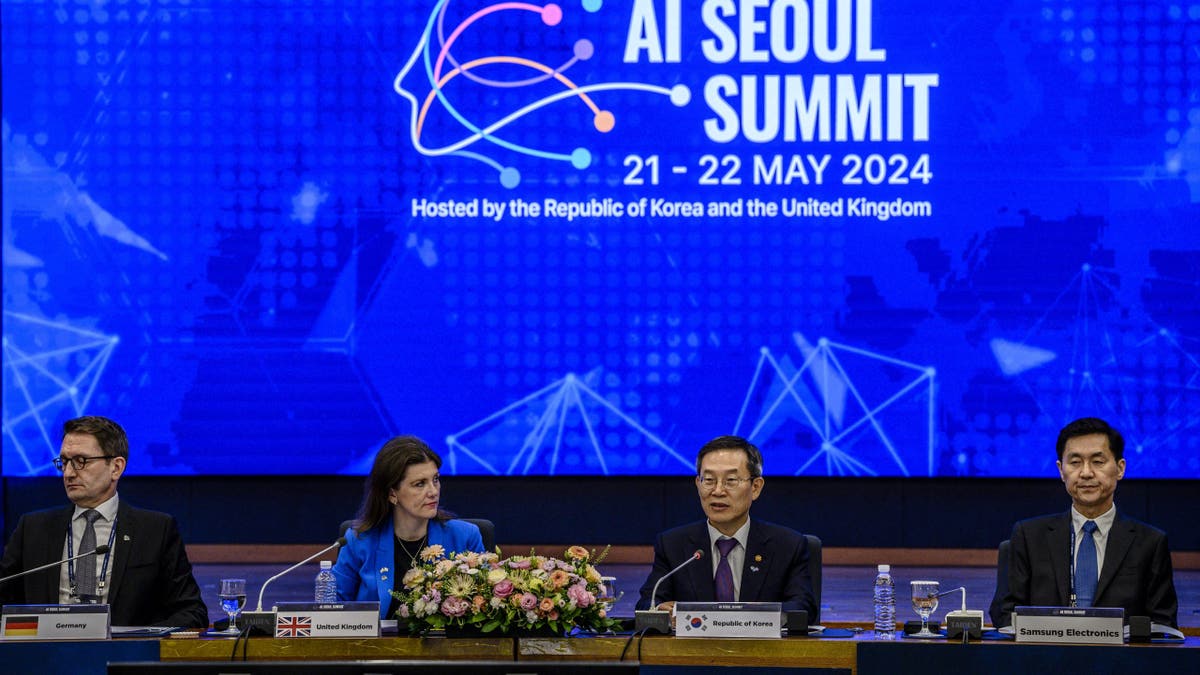
Michelle Donelan, Britain’s secretary of state for science, innovation and technology (second from left), listens as Lee Jong-ho (second from right), South Korea’s minister of science and ICT, speaks during the Ministers’ Session of the AI Seoul Summit at the Korea Institute of Science and Technology in Seoul May 22, 2024. (Anthony Wallace/AFP via Getty Images)
“It is something that the vast majority of countries around the world are members, so it would seem to me to be the logical coordinating agency, but not necessarily for convening or measurements and benchmarks.”
Siegel said the U.S. and Europe have already made “some pretty good strides” on creating long-term safety regulations, and Asian nations have “done a good job on their own and need to be brought into these discussions.”
“I just don’t know if the U.N. is the right place to convene to make that happen, or is it better for them to wait for these things to happen and say, ‘We’re going to help track and be there to help’ rather than trying to make them happen,” Siegel said.
Reuters contributed to this report.

World
‘Joker 2’ Ending: Was That a ‘Dark Knight’ Connection? Explaining What’s Next for Joaquin Phoenix’s Joker

SPOILER ALERT: This article contains major spoilers for the ending of “Joker: Folie à Deux” now playing in theaters.
Joaquin Phoenix dons his clown makeup once again in “Joker: Folie à Deux,” the follow-up to his Oscar-winning performance from 2019. This time, he’s joined by fellow Oscar winner Lady Gaga, who plays another iconic DC Comics villain, Harley Quinn.
The comic book sequel takes place after the events of “Joker,” with Phoenix’s killer clown Arthur Fleck on trial for the murders he committed in the first movie. His lawyer, played by Catherine Keener, argues that Arthur and Joker are two different people. She claims that after years of childhood abuse, Arthur developed an alter-ego that’s separate from his own mind. The prosecution is led by assistant district attorney Harvey Dent, played by “Industry” star Harry Lawtey, who’s later known as the disfigured villain Two Face in the Batman comics.
The jury sides with Dent and convicts Arthur of murder. However, before the trial can continue, a bomb explodes outside of the courtroom, sending the city into chaos. Arthur briefly escapes with the help of two Joker devotees, but he’s soon captured by police and brought back to Arkham Asylum. Also, it appears that Harvey’s face was injured in the courtroom explosion, potentially setting him up to become Two Face in the future.
The movie ends on a bloody note, as Arthur is ambushed the next day by a laughing, clearly insane Arkham patient. The inmate, played by Connor Storrie, tells Arthur a joke and then repeatedly stabs him in the stomach. Arthur falls over, bleeding profusely, and appears to die. Behind him, the unnamed psycho laughs uncontrollably and carves a Glasgow smile into his face with a knife.
Many DC fans have theorized that Arthur’s killer could be an homage to Heath Ledger’s Joker in “The Dark Knight,” since both of them sport the same gnarly scars around their mouths. Todd Phillips’ “Joker” and Christopher Nolan’s “Batman” trilogy take place in different time periods and universes, so it’s unlikely that Storrie’s character is related at all to Ledger’s.
In “The Dark Knight,” Ledger’s Joker backstory is largely unknown, and he offers differing accounts of how he got his facial scars. Early in the movie, he says his father drunkenly cut him as a child, but later he says the scars were self-inflicted after his wife was given a Glasgow smile over her gambling debt. “The Dark Knight” also took place in the modern 2000s era, while the “Joker” movies are in the ’80s, giving little evidence that the “Folie a Deux” character is anything more than a wink to Ledger’s Oscar-winning role.
It appears that Phoenix is hanging up his red suit and clown makeup with “Folie à Deux.” The “Joker” movies have existed in their own world, with no connections to Matt Reeves’ “The Batman” or James Gunn and Peter Safran’s rebooted DC Universe, so it’s unlikely Phoenix’s character will be resurrected or revisited. The next time we could see a live-action Joker may be when Barry Keoghan eventually reprises his role from the final scene of “The Batman,” perhaps in Reeves’ sequel in 2026.
World
Indian soldiers kill dozens of suspected Maoist rebels in Abujhmad forest

Police say 31 Maoist rebels killed in the central Indian state of Chhattisgarh after a nine-hour firefight.
At least 31 suspected Maoist rebels have been killed during a clash with Indian security forces, state police said.
The confrontation took place on Friday after counterinsurgency forces, acting on intelligence, surrounded approximately 50 suspected rebels in the dense Abujhmad forest, located on the border between Narayanpur and Dantewada districts in Chhattisgarh, according to Inspector General Pattilingam Sundarraj on Saturday.
The operation, which began on Thursday, led to a nine-hour firefight the following day. Security personnel have since been conducting search operations in the area and have recovered several weapons, including automatic rifles. No injuries or casualties have been reported among the government forces.
There was no immediate statement from the rebels.
Indian forces have been engaged in a long-running conflict with Maoist rebels, known as Naxalites, since 1967. The armed uprising began as a movement demanding jobs, land, and a greater share of the wealth from natural resources for the country’s impoverished Indigenous communities.
The rebels, inspired by Chinese revolutionary leader Mao Zedong, have been active across several central and northern states.
Over the years, India has invested millions of dollars in infrastructure development in remote regions as part of its efforts to combat the rebellion. The government claims to have confined the fighting to 45 districts in 2023, down from 96 in 2010.
The conflict has also seen a number of deadly attacks on government forces over the years. Twenty-two police and paramilitaries were killed in a gun battle with the far-left rebels in 2021.
Sixteen commandos were also killed in the western state of Maharashtra in a bomb attack that was blamed on the Maoists in the lead-up to national elections in 2019.
Moreover, the rebels have ambushed police, destroyed government offices and abducted officials. They have also blown up train tracks, attacked prisons to free their comrades and stolen weapons from police and paramilitary warehouses to arm themselves.
World
Idaho state senator tells Native American candidate 'go back where you came from' in forum
KENDRICK, Idaho (AP) — Tensions rose during a bipartisan forum this week after an audience question about discrimination reportedly led an Idaho state senator to angrily tell a Native American candidate to “go back where you came from.”
Republican Sen. Dan Foreman left the event early after the outburst and later denied making any racist comments in a Facebook post. He did not respond to a voice message from The Associated Press seeking comment.
Trish Carter-Goodheart, a Democratic candidate for the House District 6 seat and member of the Nez Perce Tribe, said the blowup left her shaken and thinking about security needs for future public events. It also forced some tough conversations with her two young children, Avery and Lavender, who were in attendance.
“Having conversations about racism with an 8-year-old and a 5-year-old is not something me and my husband Dane were prepared for,” Carter-Goodheart said Friday. “They’ve never seen a grown adult man have a meltdown like that. They were scared. I was scared.”
The event was held by Democratic and Republican precinct committee members from the small north-Idaho town of Kendrick on Monday night, The Lewiston Tribune reported. It was for House and Senate candidates from the local district, including Foreman; his Democratic opponent, Julia Parker: Republican Rep. Lori McCann; and her Democratic opponent, Carter-Goodheart.
About an hour into the event, someone asked a question about a state bill addressing discrimination. The candidates were each given two minutes to answer, and when it was Carter-Goodheart’s turn, she pushed back on earlier comments that suggested discrimination is not a major issue in Idaho.
She said state hate crime laws are weak, and noted that the neo-nazi group Aryan Nations made northern Idaho its home base for many years. She also talked about being the only candidate there who was a person of color.
“I pointed out that just because someone hasn’t personally experienced discrimination doesn’t mean it’s not happening,” she said. “I was making my statement, and then he shot up out of his seat and said, ‘I’m so sick of your liberal (expletive). Why don’t you go back to where you came from?’”
The Nez Perce Tribe has lived on the Columbia River Plateau in the Pacific Northwest for more than 11,500 years, including the area where Kendrick is located. The northern edge of its reservation, while only a small fraction of the tribe’s historical territory, is less than 10 miles (16 kilometers) from the Veterans of Foreign Wars hall where the forum was held.
“It was like slow motion,” Carter-Goodheart said. “I just remember thinking, ‘Go back to where you came from’? That’s within miles of where this forum is taking place. We have literal plots of land that are being leased out to family farms nearby.”
In his Facebook post, Foreman called the incident a “quintessential display of race-baiting” and said the Democratic attendees made personal attacks and “proclaimed Idaho to be a racist state.”
“Well, here is a news flash for the lefties out there. There is no systemic racism in America or Idaho,” Foreman said. “Idaho is a great state — the best in the Union!”
He then added an attack on supporters of abortion rights, saying: “And furthermore, it is immoral and against the law of God to kill unborn babies in the womb. You do not have any right to murder the unborn. There is no such thing as your self-proclaimed ‘Women’s Reproductive Rights.’ There is no such body of rights in the state or federal constitutions. And we don’t do designer rights in Idaho.”
During the exchange at the forum, Parker and McCann both said, Foreman stood up and yelled after Carter-Goodheart’s response.
“I stood up and faced (Foreman) and tried to defuse what was going on,” Parker said.
McCann said Carter-Goodheart’s description of the incident matched her own recollection.
“Her statement is accurate,” McCann told the Tribune. “(Carter-Goodheart) leaned over to me and said, ‘Where am I supposed to go?’”
The event continued for about 20 minutes after Foreman left. Carter-Goodheart said she found herself watching the only door, worried he would come back, and the female candidates checked on each other later.
“I really appreciate that about the people who are running, specifically Lori McCann,” she said. “She’s my elder and I appreciate her and her commitment to our community. We do have a big difference in our values and what we want to do for our communities, but she checked on me and I checked on her, and that was the right thing to do.”
More candidate forums are planned in coming weeks, Carter-Goodheart said. Organizers for an upcoming League of Women Voters event emailed Carter-Goodheart on Friday to say police would be there as a precaution, she said, and the Idaho Secretary of State’s Office offered guidance about security measures her campaign can pay for.
“We’ve been told, you know, it’s not a bad idea to get security,” she said. “And we need to have honest discussions about race and discrimination and the inequalities and disparities that exist not only in Idaho but across the country.”
-
/cdn.vox-cdn.com/uploads/chorus_asset/file/25439572/VRG_TEC_Textless.jpg)
/cdn.vox-cdn.com/uploads/chorus_asset/file/25439572/VRG_TEC_Textless.jpg) Technology2 days ago
Technology2 days agoCharter will offer Peacock for free with some cable subscriptions next year
-

 World2 days ago
World2 days agoUkrainian stronghold Vuhledar falls to Russian offensive after two years of bombardment
-

 World2 days ago
World2 days agoWikiLeaks’ Julian Assange says he pleaded ‘guilty to journalism’ in order to be freed
-

 Education1 week ago
Education1 week agoVideo: Los Angeles Bus Hijacked at Gunpoint
-

 Technology1 day ago
Technology1 day agoBeware of fraudsters posing as government officials trying to steal your cash
-
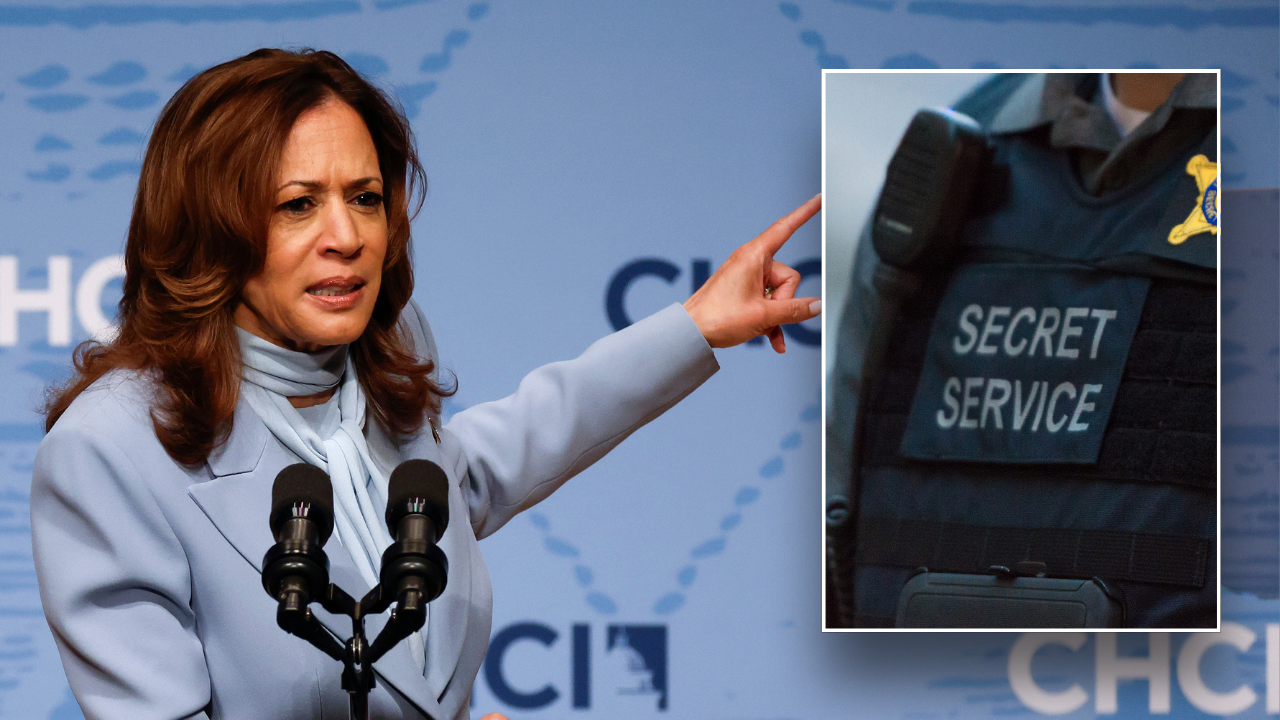
 Politics1 week ago
Politics1 week agoSecret Service agent accused of sexually assaulting Harris campaign staffer: report
-
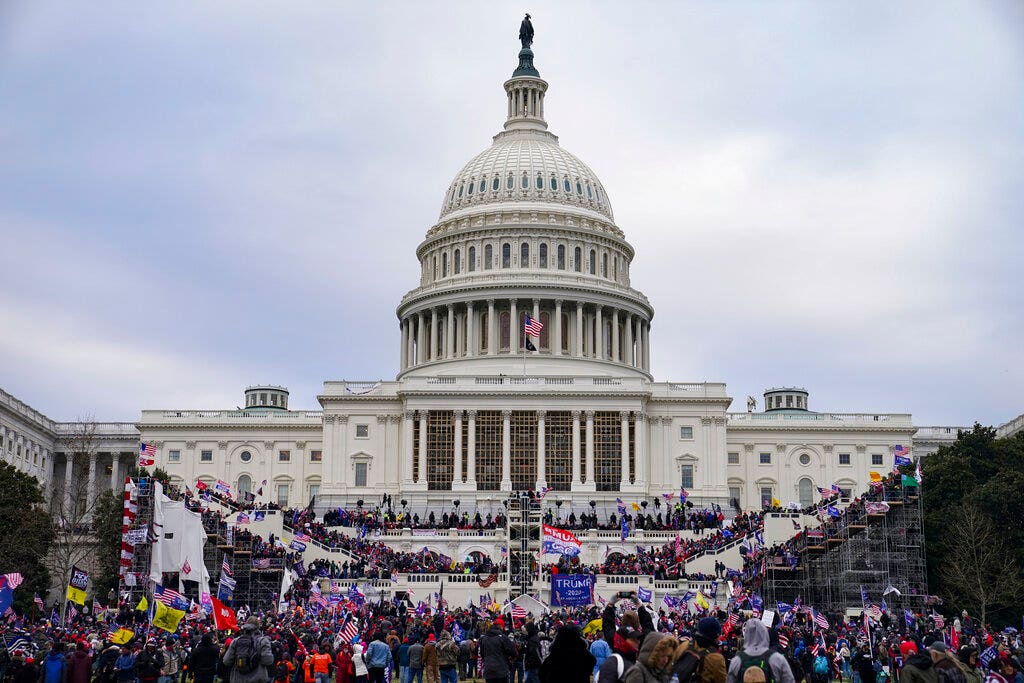
 Politics1 week ago
Politics1 week agoDOJ inspector general does not deny FBI informants were among Jan 6 crowd
-

 World1 week ago
World1 week agoPutin outlines new rules for Russian use of vast nuclear arsenal











